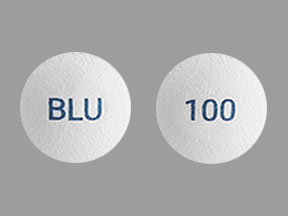Avapritinib Disease Interactions
There are 3 disease interactions with avapritinib.
Avapritinib (applies to avapritinib) hepatic impairment
Moderate Potential Hazard, Moderate plausibility. Applicable conditions: Liver Disease
Exposure to avapritinib is increased in patients with severe hepatic impairment and a lower starting dose is recommended for all indications. No dose adjustment is recommended for patients with mild (total bilirubin at the upper limit of normal [ULN] or less and AST greater than ULN, or total bilirubin greater than 1 to 1.5 x ULN and any AST) or moderate (total bilirubin greater than 1.5 to 3 x ULN and any AST) hepatic impairment.
Avapritinib (applies to avapritinib) intracranial hemorrhage
Moderate Potential Hazard, Moderate plausibility. Applicable conditions: Cerebral Vascular Disorder, Cerebral Aneurysm, Aortic Aneurysm, Thrombocytopenia, Coagulation Defect
Serious and fatal intracranial hemorrhage has been reported in patients treated with avapritinib. Patient conditions and risk factors for intracranial hemorrhage include a history of vascular aneurysm, intracranial hemorrhage or cerebrovascular accident within the prior year, concomitant use of anticoagulant drugs, or thrombocytopenia. In patients with advanced systemic mastocytosis (AdvSM), ensure platelet counts are performed prior to treatment, and then as recommended during therapy. Do not initiate treatment in patients with AdvSM if platelet counts are less than 50 x 10(9)/L.
Avapritinib (applies to avapritinib) renal impairment
Moderate Potential Hazard, Moderate plausibility. Applicable conditions: Renal Dysfunction
The effect of severe renal impairment (CrCl 15 to 29 mL/min) or end-stage renal disease (CrCl <15 mL/min) on the pharmacokinetics of avapritinib is unknown, and the recommended dose of avapritinib has not been established for these patients. No dose adjustment is recommended for patients with mild or moderate renal impairment (CrCl) 30 to 89 mL/min estimated by Cockcroft-Gault].
Switch to professional interaction data
Avapritinib drug interactions
There are 469 drug interactions with avapritinib.
Avapritinib alcohol/food interactions
There is 1 alcohol/food interaction with avapritinib.
More about avapritinib
- avapritinib consumer information
- Check interactions
- Compare alternatives
- Reviews (3)
- Side effects
- Dosage information
- During pregnancy
- Drug class: multikinase inhibitors
- Breastfeeding
- En español
Related treatment guides
Drug Interaction Classification
| Highly clinically significant. Avoid combinations; the risk of the interaction outweighs the benefit. | |
| Moderately clinically significant. Usually avoid combinations; use it only under special circumstances. | |
| Minimally clinically significant. Minimize risk; assess risk and consider an alternative drug, take steps to circumvent the interaction risk and/or institute a monitoring plan. | |
| No interaction information available. |
See also:
Further information
Always consult your healthcare provider to ensure the information displayed on this page applies to your personal circumstances.


